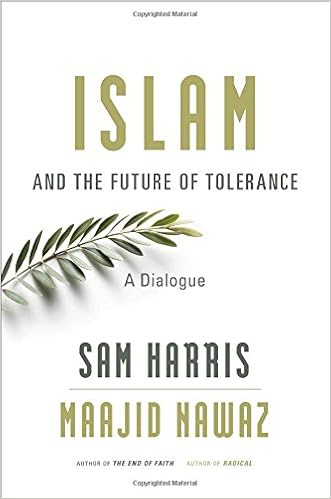"Islam and the Future of Tolerance" by Sam Harris and Maajid
Nawaz
Harvard University press (2015)
ISBN: 9780674088702
Price: £9.77 (Amazon UK)
Harvard University press (2015)
ISBN: 9780674088702
Price: £9.77 (Amazon UK)
I picked up this book after watching a number of debates in this matter by
both writers. With a keen interest in both current affairs and Islamic Theology
and Exegesis, I decided to give the book a read, not having any real
presumptions as to the depth of content. On this matter, I was presently
surprised, with the book portraying a fair and balanced discussion of the
question of the links between exegesis and faith, as well as the social issues.
The book itself is a short read, at 128 pages, and can be easily read over
a few days. It is formatted as a dialogue between the two thinkers, with Sam
Harris often portraying the student and stating the issues, with Maajid Nawaz
filling in the details from the Islamic perspective,
followed up by Sam Harris' response of 'I agree but..." to move the
conversation on. In some areas it is split into sections, however this is only
where there is a significant shift in the conversation.
The topics discussed in the book mainly focus on the question of how to
tackle Islamic extremism and its source. it starts this by looking at the
problem of identifying the exact issue, doing this by clarifying the names of
the different forms of extremism faced (Specifically the difference between
types of Islamism and Jihadism) and illustrating the difficulties caused by
misattributing thinkers and events to a
different school of thought. The discussion then moves on the failure to tackle
the problem in the west and how this is exacerbated by the ‘regressive left’
and rise of the far right across Europe. This finishes on the more
controversial question on whether this strain of thought is inherent in Islam,
to which there is a fascinating discussion of schools of Exegesis and the
variety of thought in medieval Islam, along with some harsh condemnations of
the illusory ‘Islamic Utopia’ sold to us by many modern popular historians.
Some of the key
points I enjoyed about the book were the honesty, the candid nature of the
discussion and the fact that it opened up a topic for discussion which is shied
away from by many for fear of being branded as a bigot or islamophobe. The
early discussion on the issue of the ‘Liberal Betrayal’ opened the book up for
this honest discussion of the topic in a way which is rarely seen, something which
is not possible in many academic texts, which demonstrates an advantage of the format
and the open-mindedness of Nawaz with regards to his willingness to critique
the ideas rather than attack a strawman. As well as this, the discussion of the
exegetical schools and Nawaz’s readable yet sufficiently academic explanations
of such concepts as Taqqiyah allowed for the reader not to be drawn into any of
the traditional polemical ideas which we see on the side for the far right.
In the same way,
Sam Harris’ role as the skeptic worked well in the text, an example of this
being his assault on the mythical ‘Utopia’ view of the Ottoman Empire. This
position allowed for the more balanced approach, instead of the book becoming
the ‘Maajid Nawaz show,’ with some very frank statements on attempts to put the
concept islamic extremism down to purely political grievance allowing the book
to tackle the issue of islamic Extremism straight and in a way which maintains
the interest of the readers, many of whom would have picked this book up with
the intention of seeking a fair discussion of the question of the link between Islam
and Extremism.
The format, as
well as being what stabilizes the book, is also the cause of my one criticism.
Due to the conversational format of the text it is prone to the occasional
glossed over and unclarified statement, in some cases leading to factual error.
One of these points which caught my attention was Nawaz’s claim comment on the
Council of Nicaea being the point at which Rome accepted Christianity. This
point is clearly a factual error, but due to the book being in a dialogue, the
point is one simply glanced over as an example of ‘Dominant Doctrines’ and
their power rather than clarified or linked to another point. The happens on a
few occasions in the book and at times can hit the reader with a reminder that
the book is not a piece on religious thought specifically but a dialogue
between two academics discussing a socio-political issue developing in the
realm of religion.
So would I
recommend the book? Yes. It is a very good short read into this complex and
often misappropriated topic of Islam and Extremism, and sufficiently covers and
clarifies the more complex points of it to make the reader satisfied that the
text delivers on its promise of a reasonable and fair dialogue which does not
avoid controversy or sell itself as a polemic. Overall, an excellent starting
point for some truthful and honest discussion on a matter which is avoided far
too often.


No comments:
Post a Comment